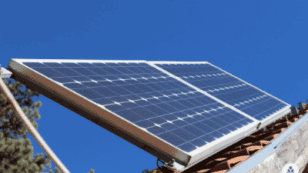
How Much Do Solar Panels Cost in Michigan? (2024 Savings Guide)
In this EcoWatch guide on the cost of solar panels in Michigan, you’ll learn:
- What the average cost of going solar in Michigan is
- How Michiganians can save money when going solar
- Which local installation companies have the best prices
This guide has helped thousands of Michiganian homeowners save time and money when going solar in the Great Lake State. Let’s get started!
Each product and or company featured here has been independently selected by the writer. You can learn more about our review methodology here. If you make a purchase using the links included, we may earn commission.
Michigan homeowners face high energy costs, but they have smaller electricity demands than many other areas of the country. This makes the Great Lake State an ideal place to go solar – helping you save more money when switching to solar power than most people in the U.S.
But solar energy does require a relatively large up-front investment: Just over $25,000, on average. In this guide, we’ll be discussing the average price of solar panels in Michigan, what factors affect your conversion costs, how to save money when going solar in the area and more.
What Will Your Solar Panel System Cost in Michigan?
The average all-in cost to go solar in Michigan is around $25,340, before any incentives or credits are applied. Once you factor in the federal solar investment tax credit, or ITC, your net cost in Michigan comes out to about $17,738.
These prices are based on the average per-watt cost for solar panels in the state — $3.62 — and the typical system capacity needed to offset the local energy demands — 7 kilowatts (kW). That per-watt cost to install solar panels is higher than you’ll see in most states, but Michigan residents generally need a much smaller system. This helps keep the overall cost relatively low.
One of the most significant cost factors when assessing your total for converting to solar will be the size of your system. Larger homes that need more electricity to heat or cool typically require larger solar panel systems to run – and larger systems cost more money.
The table below includes a quick breakdown of average system totals based on the size of the system you need for your home. You may be able to look at a recent utility bill to help you figure out where on this chart your home falls.
| Solar System Size | Energy Use (kWh per month) | House Size (sq ft) | Total Cost | Cost After the Federal ITC | Energy Savings (over 25 years, after system is paid off) |
| 4 kW | 400 kWh | 1,100 | $14,480 | $10,136 | $13,048 |
| 5 kW | 500 kWh | 1.300 | $18,100 | $12,670 | $16,310 |
| 6 kW | 600 kWh | 1,500 | $21,720 | $15,204 | $19,572 |
| 7 kW | 700 kWh | 1,700 | $25,340 | $17,738 | $22,834 |
| 8 kW | 800 kWh | 1,900 | $28,960 | $20,272 | $26,096 |
| 9 kW | 900 kWh | 2,100 | $32,580 | $22,806 | $29,358 |
| 10 kW | 1,000 kWh | 2,300 | $36,200 | $25,340 | $32,620 |

The Green Panel

Local Service
Average cost
Pros
- Outstanding customer service
- Excellent reputation
- Great warranty coverage
Cons
- No leases or PPAs

Strawberry Solar

Local Service
Average cost
Pros
- Outstanding customer service
- Representatives are experts on local policies
- Educational, no-pressure sales approach
Cons
- Limited warranty coverage
- No leases or PPAs
- Limited brands of solar equipment available

Blue Raven Solar
Pros
- Industry-leading in-house financing
- Competitive pricing
- Excellent reputation
Cons
- Doesn't offer solar batteries (coming 2022)
How Do Michigan’s Solar Prices Compare to the National Average?
The average cost per watt for photovoltaic (PV) equipment in Michigan is well above the U.S. average: $3.62 compared to $3.33.
However, Michiganders use far less electricity than most Americans, according to the Energy Industries Association. That means residents in the Great Lake State need smaller solar arrays to offset their consumption. The average solar array size in the state is 7 kilowatts (kW), compared to the national average of 9 kW.
Despite the price per watt being higher in Michigan, the total conversion cost is still well below average, thanks to those smaller size requirements. You can expect to pay $17,738 for a solar energy system in Michigan after the federal tax credit, while most U.S. solar customers pay an average of $20,979.
Most importantly, the typical solar system in Michigan pays for itself in just 10 years, which is one year faster than the national average. You’ll also save more over time: The lifetime savings of converting to solar in your state total around $32,403, compared to the average of $31,513 in other states.
What Are the Main Factors of Solar System Costs in Michigan?
There are many factors that affect the upfront and long-term price of your home solar system, so while the average conversion cost sits at around $17,738, it’s not unusual to see totals ranging from $10,136 to $25,340. Some of the most influential cost factors in your area include:
- The average snowfall in your city
- Whether or not you install solar batteries
- How efficient your panels are
We’ll explain why these factors are so pivotal when it comes to pricing in the following sections.
Michigan Snow Fall Will Limit Solar Panel Production
Michigan is known to have above-average amounts of snowfall, but some areas see double what you’d expect in other cities, in large part because of lake-effect snowfall. Cities close to Lake Michigan and Lake Superior, like Grand Rapids and Marquette, naturally see much higher snowfall each winter season.
When your panels get covered in snow, they won’t receive any significant amount of sunlight and won’t generate power for your home. In areas where heavy snowfall is expected, it might be necessary to oversize the system to compensate for the losses. Installing more panels means a higher initial cost.
We recommend having a professional size your system for you, as they can account for the snowfall and sunlight intensity in your specific area, take your energy demands into consideration and figure out the ideal system size that works for your home in particular.
Adding a Solar Battery Will Provide Backup Power During Michigan Winters
A lot of Michiganders choose to couple their panels with solar batteries, which can drive up your costs to install your system by thousands or even tens of thousands of dollars.
But solar batteries can be well worth the cost, providing a few major benefits to residents in Michigan. First, they provide power during blackouts, which is important since Michigan is the state with the highest number of power outages per capita.
Second, batteries store excess power during times of high energy production — like sunny days — and let you use it for free during times of low production — like at night or on cloudy days. This is a huge benefit in Michigan, where energy prices are so high.
High-Efficiency Solar Panels Are Recommended in Michigan
Michigan also sees just 170 sunny days per year, which is one of the lowest in the country and well below the average of 205.
In order to get the most out of your panels on those prevalent cloudy days, you might need to invest in high-efficiency panel brands. These will produce more power in all conditions, but they also cost more on a per-watt basis in most cases.
Especially since energy is so expensive in the state, we generally advise homeowners in Michigan to pay more initially for high-efficiency panels. The cost will be higher, but they’re far more likely to offset your above-average energy bills and save you more money in the long run.
We typically recommend SunPower (Maxeon) solar panels to any homeowners who are looking for a more efficient option. You can click the below button to get a free, no obligations quote from them in minutes.
Additional Costs of Going Solar in Michigan
In addition to paying for panels, there are some other smaller costs to consider when pricing out your rooftop solar system. Some other things that can contribute to your total include the following:
- Building permit filing and inspection fees: Before your panels can be legally installed on your home, your local building department will require that permits be pulled to ensure the work is safe to complete. After the work is done, a building inspector will need to inspect the work to ensure it was done up to code and close out the permits. Most municipalities in Michigan charge a permit filing fee and inspection fees that total between $25 and $400.
- Interconnection application and inspection fees: In order to connect to the power grid, your utility company will require an interconnection application and will usually want to have an electrician inspect the work to make sure it was done safely. The fee for these is usually small, but it can add up to around $100 to your total.
- Additional solar equipment: Panels make up the majority of your equipment costs, but your installer will also need to purchase and install mounting racks, wiring and inverters if your panels don’t include microinverters. These pieces of equipment can add a few hundred dollars to your installation costs in some cases.
- Labor and administrative fees: Finally, you’ll, of course, need to pay for the labor to install your system, which can include equipment markup. You might also need to pay administrative fees for things like filing for permits, local incentives and rebates. This line item can range from a few hundred dollars to a few thousand, so we’ve included this in our average costs mentioned above.
Watch Below: What Should You Expect When Going Solar in Michigan?
What Maintenance Costs Can Solar Owners Expect in Michigan?
Thankfully, solar arrays are more or less “set it and forget it,” so you don’t have to worry much about panel maintenance. It’s possible for dirt, pollen and other debris to accumulate on top of your panels and decrease efficiency a bit, but the rainfall and snowfall in Michigan should keep them relatively clean and efficient.
You might need to consider clearing snow off of your panels if you don’t expect it to slide or melt off for a few days. The longer your panels sit covered in snow, the more potential energy savings you’ll miss out on, which can be a big deal in your area, given the high energy costs.
In most cases, though, the snow will slide off of the panels enough to keep production up. If you do run into an issue with energy generation after snowfall, you can clear the panels yourself using a roof broom.
In most cases, property owners never have to pay for any panel maintenance. Any issues with components and function should be covered under your manufacturer’s protection plan, which lasts an average of 25 years.
Which Solar Financing Options Will Help You Save the Most in Michigan?
There are four main payment options for solar equipment: cash, solar loans, solar leases and power purchase agreements, or PPAs. Each comes with its own upsides and drawbacks.
Buying your system in cash means paying for the entire thing at once, which is not always a realistic option for many homeowners, even in Michigan, where system costs are below average. However, if you can swing a cash purchase, you’ll own your panels immediately, enjoy the fastest payback period and see the highest long-term savings of all the options.
Taking out a loan to fund your solar project is the next best option, in our opinion, and since there’s often no down payment required, it’s far more accessible.
With a loan, you’ll pay interest that will eat into your savings over time and lead to a longer payoff period, but having no initial costs makes it a reasonable option for most. Plus, you still own your panels once the loan term ends, so you’ll still be able to take the federal solar tax credit.
If you choose a solar lease, you pay a fixed monthly rate to rent the panels and get to use the energy they generate to offset your consumption. Since the monthly payment never goes away, you never own your panels and never see a payoff point where savings skyrocket.
Leases don’t let you take the federal credit and yield far lower savings, but they are accessible to most since they have no down payment requirements and don’t have the same credit score requirements that loans have.
We don’t typically recommend a PPA. With this arrangement, you get panels installed at no cost and you agree to pay a slightly below-retail rate per kWh for the energy it produces that you consume in your home. It’s similar to a lease, but not as advantageous to you.
To figure out which option works best for you, we recommend starting by using our solar calculator to calculate how much panels for your home would cost. Once you know your expected installation costs, you can figure out which options are accessible and use the chart below to opt for the one that saves you the most.
| Financing Method | Total 25 Year Savings | Initial Costs | Monthly Payments | Payback Period |
| Cash | $32,403 | $25,340 | $0 | 10 years |
| Loan | $28,000 | $0 | $125–$250 | 14 years |
| Lease | $5,000 | $0 | $115 | N/A |
| PPA | $4,000 | $0 | $115 | N/A |
What Are Other Ways You Can Save When Going Solar in Michigan?
Even though solar power systems in Michigan are below average in price, they’re still quite expensive, so most homeowners look for ways to save money when converting. Below, we’ll include a few things you can do to bring down your costs as much as possible in your area.
- Choose a high-efficiency panel brand
- Take advantage of Michigan solar incentives
- Consider installing a solar battery
- Make sure you get a good warranty
We’ll explain how each of these can boost your savings upfront or over time in the following sections.
Choose a High-Efficiency Panel Brand
Michigan sees far fewer sunny days per year than most states, and there’s also relatively heavy snowfall for a good portion of the year, especially in cities near the Great Lakes.
Cloudy days will naturally lead to a dip in solar production, so a panel with a high energy efficiency rating is necessary to take maximum advantage of the sunlight that is available. Snow coverage will also cause severe drops in production, especially if your solar panels remain partially covered for days at a time.
Especially given the above-average electricity rates in the state, maximizing your production when the sun is shining on your solar panels is crucial if you want to see the highest possible energy savings. The cost of solar panels with a high efficiency rating might be more upfront, but we believe they’re well worth the investment in an area like Michigan.
Over the lifespan of your system, a high-efficiency panel brand could save you hundreds or even thousands more than if you chose a less efficient brand.
This is especially true if you choose a monocrystalline panel with 20% efficiency or higher as opposed to a polycrystalline panel, which typically have efficiency ratings around 15%. We suggest investing in the best solar panel with a high efficiency that you can afford.
Take Advantage of Solar Incentives
All U.S. solar customers currently have access to the federal tax credit, which provides potential savings of about $7,602 in Michigan for a typical solar installation. Taking this credit is one of the easiest ways to push up your savings and accelerate your panel payback period.
There are also incentives available on a state level that you should look into. These include solar rebates from certain electric companies — like Lansing Board of Water & Light — net metering from companies like DTE Energy, Consumers Energy and Upper Peninsula Power Company and a statewide property tax exemption for PV equipment.
Solar incentives in Michigan can potentially save you between $6,000 and $12,000, on average, and some customers’ savings are even higher.
Consider Installing a Solar Battery
Michigan doesn’t mandate net energy metering (NEM), and while a few power companies do offer it, it’s not generally the best deal. That’s why many Michigan residents install a solar battery to save money over time.
A battery storage system will typically bump up your installation costs by around $10,000, but you stand to save more than that over the life of the equipment. A battery provides you with effective net energy metering, allowing you to store excess energy to offset consumption when the sun isn’t shining, which is a common occurrence in Michigan.
The additional savings you could see from a battery could total hundreds and sometimes thousands of dollars, given the high electricity rates in the area.
Make Sure You Get a Good Warranty
Finally, we recommend you opt for a solar brand that includes a solid workmanship warranty. Since the snowfall is well above average in Michigan, your solar panels will be exposed to a lot of moisture, and any issues with the installation can lead to leaks over time.
You might pay more for a provider that does a professional installation that’s covered for 20 years or more — the standard in the solar industry — but we think it’s worth the peace of mind and avoiding the potential repair costs you’d face if you experienced a leak down the road.
What Are the Typical Costs of Michigan’s Solar Installers?
According to the Solar Energy Industries Association (SEIA), there are around 84 solar panel installation companies to choose from in Michigan. Each installer charges different prices for its labor and can markup the equipment it installs differently. This leads to prices being wildly different among installers in the area.
The table below includes a side-by-side comparison of some of the top solar installers in Michigan, including relative pricing to help you decide which options are likely to fit into your budget.
| Solar Company | Superlative | EcoWatch Rating | BBB Rating | Average Cost ($–$$$$$) |
| The Green Panel | Outstanding Local Installer | 5.0 | C+ | $$$ |
| Strawberry Solar | Outstanding Local Installer | 4.5 | A+ | $$$ |
| Windfree Solar | Outstanding Local Installer | 4.0 | A+ | $$$ |
| Michigan Solar Solutions | Solar Veteran | 4.0 | A+ | $$$ |
| SunPower | Best National Provider | 5.0 | A+ | $$$$ |
How Are Solar Costs and Regulations Trending In Michigan?
Solar panel costs in Michigan have dropped over 50% in the last decade, according to the SEIA. We expect prices to continue to fall as equipment production becomes more affordable and more customers make the switch to renewable energy.
Michigan’s renewable portfolio standard (RPS) goal recently expired in 2021, and it has yet to implement a new mandated goal to push renewable energy adoption forward. Without a new RPS goal, we feel it’s unlikely that the state will offer new incentives in the near future.
There’s also no plan in place to get rid of existing programs. NEM programs are changing across the country, so that would likely be the first thing to change in Michigan. Since net energy metering isn’t mandated, it’s unlikely that we’ll see any negative changes to policies.
With prices lower than ever before and no expected positive changes to tax incentives and other perks, now is a great time to convert to clean energy in your area. You can use the tool below to get solar quotes customized for your home from high-quality, reliable installers.
The cost information presented in this article is derived from a comprehensive analysis, incorporating data from multiple industry sources. The average cost per watt per state was calculated based on figures from Consumer Affairs, Energy Sage, and Berkeley Lab’s Electricity Markets & Policy Department. Additionally, monthly energy consumption and the average monthly cost of electricity were sourced from the U.S. Energy Information Administration, ensuring a well-rounded and accurate representation of the information presented.
FAQs: Michigan Solar Panel Costs
Below, we’ll answer some of the questions we see most often about the cost of adopting solar in Michigan and what to expect throughout the conversion process.
The typical solar array in Michigan costs about $25,340 before the federal tax credit or $17,738 after the credit. That represents the average cost of a 7 kilowatt system, at an average of $3.62 per watt. Many factors can affect your pricing, but most solar power systems in the state fall between $10,136 and $25,340 after the federal credit is applied.
Converting to solar in Michigan costs around $17,738, on average, after the federal credit. Given the high cost of energy the solar panels will offset, that price is expected to be paid back in solar energy savings over just 10 years. Over the expected 25-year life of a solar array in Michigan, the solar panels will pay for themselves and then save an average of $32,403 on electricity.
Solar leases have their place in the solar industry, but we always recommend buying your panels outright or financing when you have the option.
Leases are good for some solar customers who cannot secure financing, as they reduce the barrier to entry by limiting upfront costs. However, leases save you the least over time and don’t allow you to take advantage of solar incentives.
On the other hand, purchases and financed systems can sometimes be more costly upfront but always lead to more significant savings over time. With the solar financing options available in Michigan — like Michigan Saves and the PACE program discussed above — solar financing is accessible to most residents. When you buy or finance your solar panel system, you can take advantage of all solar incentives and rebates, plus you’ll enjoy a large bump in home value.
Yes, it is possible to eliminate your energy bills using a solar panel system, and many residents throughout Michigan do precisely that. However, it is more difficult in MI than in many other states because of the varying and sometimes unappealing net metering policies and electricity prices.
The size of your roof, your utility company’s policies, your average energy production, and several other factors will affect how easy it is to reduce your electric bill to $0. Contacting a reputable solar company in MI to assess your home is the best way to determine if this is possible for you.
Top Solar Installers In Michigan Cities
Comparing authorized solar partners
-
- Outstanding customer service
- Excellent reputation
- Great warranty coverage
- No leases or PPAs
A+Outstanding Local Installer
Having trouble deciding? Click below and use our process to receive multiple quotes instead:

 233k
233k  41k
41k  Subscribe
Subscribe 







